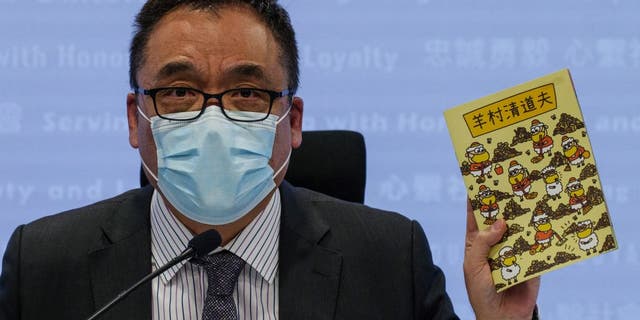

Authorities have interpreted the book as referring to Hong Kong and Beijing. Officers relied on a colonial-era law to justify sending the men to prison, according to QZ.
Both men were released on bail but must report to the police next month, the BBC reported. Police seized several copies of the books during their search.
TRUMP CALLS FOR ‘RETRIBUTION’ AGAINST CHINA FOR ROLE IN COVID-19 PANDEMIC

Hong Kong's senior superintendent Steve Li, from the city's new national security police unit, holds up a children's book which allegedly tries to explain about the city's democracy movement, at a police press conference in Hong Kong on July 22, 2021, after five members of a pro-democracy Hong Kong union were arrested for sedition for publishing the titles. (Daniel Suen/AFP via Getty Images)
The book, one of three in a series called Yangcun, caused an uproar last year when a government-nominated judge ruled it constituted "seditious intention" and jailed five speech therapists to 19 months in prison for publishing it.
The court stressed that the punishment was for the "harm or risk of harm to the minds of children" and the potential to sow seeds of "instability," according to The Independent.
TRUMP JR. ACCUSES BIDEN OF USING TIKTOK AS SCAPEGOAT TO DISTRACT FROM FAMILY'S TIES TO CHINA

Children's books are pictured during a press conference after five people were arrested under suspicion of conspiring to publish seditious material at the Hong Kong Police Headquarters on July 22, 2021, in Hong Kong, China. (Anthony Kwan/Getty Images)
"What the defendants have done to the children aged four and above was in fact a brainwashing exercise with a view to guiding the very young children to accept their views and values," the judge said.
The arrests this week would be the first for simply owning the book, which critics argue represents a serious deterioration of freedoms in the country.
HOUSE LAWMAKERS FOCUS ON ‘OUTCOMPETING CHINA’ IN BIPARTISAN VISIT TO GUYANA

Content of children's books are displayed on a TV screen during a press conference after five people were arrested under suspicion of conspiring to publish seditious material at the Hong Kong Police Headquarters on July 22, 2021, in Hong Kong, China. (Anthony Kwan/Getty Images)
Hong Kong remains a Special Administrative Region of China with a "one country, two systems" understanding with Beijing, but the rights afforded to the citizens of the island have slowly eroded since 2020 with the implementation of a national security law that aimed to crack down on widespread protests.
The use of an even more outdated law and the vague interpretation of "seditious" showed the lengths Chinese officials will go to in their efforts to restrict dissent, according to Prof. Johannes Chan, a former chair of public law at the University of Hong Kong.
"If a cartoon in [a newspaper] is considered seditious, every single reader who has kept a copy of the newspaper could be guilty of the possession offense," Chan, who is a visiting professor at University College London, told The Guardian. "This could hardly be compatible with the guarantee for free speech in the Basic Law or the bill of rights."
